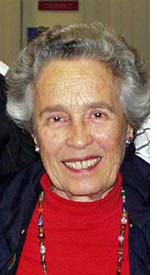By Eileen Wingard

LA JOLLA, California — The opening evening of the 2012 poetry reading series in the Astor Judaica Library featured three women, Frieda Levinsky, Elizabeth Schwartz and Sue Marder.
Levinsky, a native of Poland and a Holocaust survivor with famous Talmudic scholars among her ancestry, is an award-winning published poet. One of her poems was about Moses, leader of the Exodus from Egypt:
Moses
Today a Jewish people dwell
On this holy soil on which
You have never seen,
The land of milk and honey
Where the sun dazzles our eyes.
Your words which God inspired
You to speak are nearly everywhere
On this holy land on which you have
Never walked. Yet miraculously
You have left your imprints
Inspired by God.
The synagogues, the parks, the narrow
And broad streets which you have
Ennobled with your words will be etched
In men’s minds on every path that
Mankind trods.
You need no monuments in any hall:
Your name alone evokes noble deeds.
Can anything compare to the Decalogue
Which we hold high in our esteem?
Elizabeth Schwartz, a New York transplant and well-known songstress with her husband Yale Strom’s Klezmer Band, Hot P’stromi, sang her original Yiddish song which she wrote for the musical play, The Witches of Lublin. Her other poems were English lyrics written to Klezmer melodies. The following was set to the tune of “The Bosnian Waltz,” taught to Schwartz by Cili Svart of Iasi, Romania. Cili and her husband Itzik were Holocaust survivors who lost spouses and children, only to meet and renew life together
THE PLUM TREE
Sit with me beneath this old plum tree
Tell me your name, what you’ve seen
I can see that you are much like me
My memories are still green
Before the iron thorns, I held between these hands another face
Before the iron thorns, the plums were sweet, their branches intertwining lace
Before the iron thorns, I never thought I’d ever live to see
small blossoms easily erased
Are there new trees
Are there new dreams
That might be green
Let me tell you how it was with me
Leaves can be shed much more easily than tears
Shall we walk and leave our old plum tree
Walk through the unnumbered years
Before the iron thorns, you’d see a different girl, a different me
Before the iron thorns, I never wondered what it meant to not be free
Before the iron thorns, the branches of this bent and old plum tree
Were ripe with possibility
We’ll find new trees
We’ll find new dreams
And they’ll be green
Sue Marder, who hails from Kansas City Missouri, and has traveled the world, engaged the audience with her humorous verse. In a more serious vein, she shared one of the many poems inspired by the death of her beloved husband, Robert Marder.
A TIME
A time of sadness
A time of weeping
A time of losing
the life I knew
A time of parting
A time of grieving
A time of closing
the life I knew
A time of learning
A time of growing
A time of starting
a life anew
The hour of featured poets was followed by ten people reading for the open microphone. Among them were poets who had been featured in previous years, Michael Horvitz, Jewish Poets—Jewish Voices committee member; Dr. Steven Baird; Sara Appel-Lennon; Simon Patlis, reciting his Russian poetry with their English translations, and the evening’s moderator, Joy Heizmann, reading selections from her daily haikus. Not only have these evenings become venues for listeners to hear surprisingly interesting and entertaining poetry and song lyrics presented by their creators, but the gatherings are fostering a community of poets.
The next evening of Jewish Poets—Jewish Voices will take place Tuesday evening, February 21, 7:00 pm at the Astor Judaica Library. Bonnie Baron, a Clinical Social Worker, will read the poetry of her late mother, Gertrude Rubin, a published poet who received her Masters of Fine Arts in Poetry from the University of Illinois and was inspired to write when she joined Women Mobilized for Change and marched at Attica Prison and on Washington, DC during the Civil Rights Movement.
The second poet will be Dr. Ida Deichaite, a Lithuanian-born biologist, who works in oncology at UCSD. Ida lived in Germany and Israel before settling in the US. She studied at the Hebrew University, the Weizmann Institute, Memorial Sloan Kettering and Princeton University. Ida not only writes poetry, but she is also an artist whose works were on display last fall at the Andrews Gallery in downtown San Diego.
Joan Kurland, pianist, singer, songwriter, performs frequently at functions ranging from parties to funerals. She teaches piano and voice and writes customized songs for all occasions. Joan attended Oberlin College and the Juilliard School in New York.
The open microphone will be available to all wishing to share a single work or two, not to exceed five minutes.
The final evening of Jewish Poets—Jewish Voices will take place on Tuesday evening, March 24, 7:00 pm and will feature high school students. These programs are free and open to the public. For further information, call: 858-362-1150
*
Wingard is a freelance writer based in San Diego. She may be contacted at eileen.wingard@sdjewishworld.com